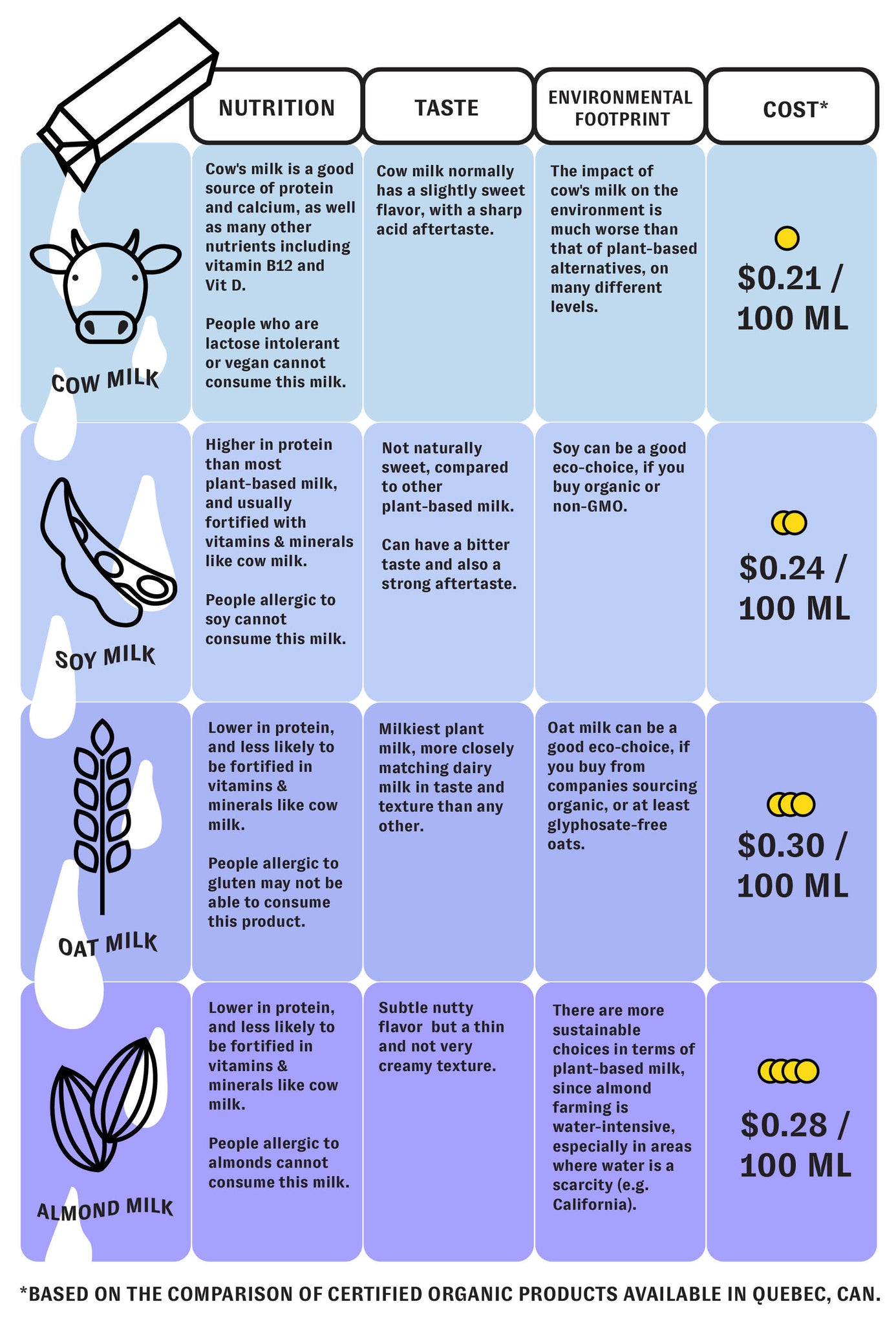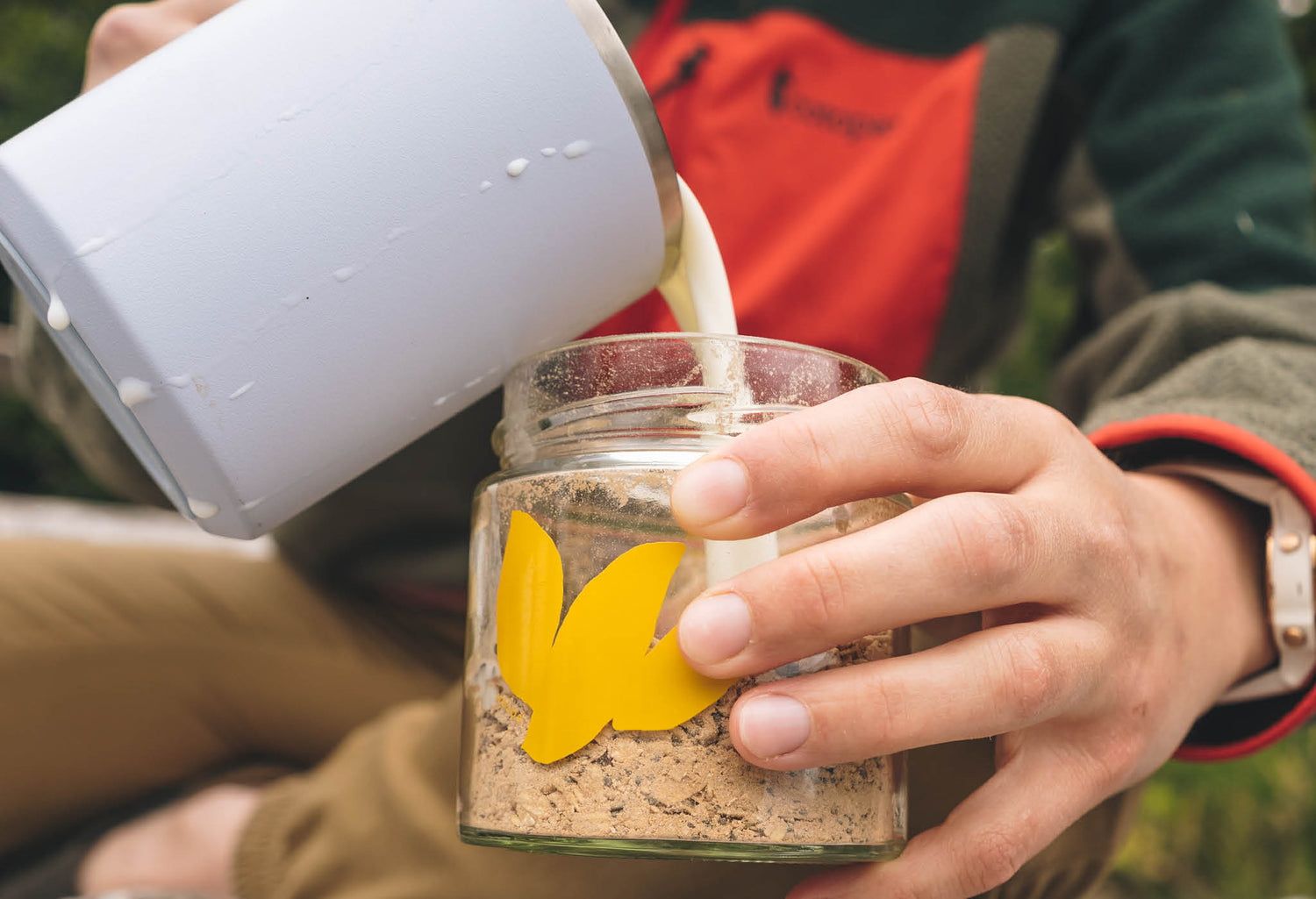Milk is the staple of many diets throughout the world. However, while it used to be safe to assume that when you refer to milk that it would come from a cow, nowadays there are a variety of alternative milk choices that are both nutritious and delicious for you to choose from when you’re filling up your jar of HOLOS.
No matter what your tastes veer towards, however, it’s really up to each person to decide which type of milk is best for them, both nutritionally and cost-wise. These myriad milks have risen in popularity as of late, making them much more accessible to the average person from the neighborhood grocery store. So in order to help you make the most educated decision when it comes to your milk of choice, today we’re breaking down the nutritional benefits, environmental footprints, and the differences in taste and cost between a few different types of dairy, nut, and other alternative milks.
Whether you’re vegan or an omnivore, there’s a milk out there that’s perfect for you, and we’re here to help you find it.

Cow’s Milk: Chock Full of Protein, Vitamins, and Minerals.
There are many nutritional benefits to drinking good ol’ dairy milk–after all, its main purpose is to help cow calves grow big and strong. Not only is cow’s milk packed full of protein, just one cup of it is also fortified with the following vital vitamins and minerals: (1)
* 28% of your daily recommended intake of calcium.* 24% of your recommended daily intake of Vitamin D.
* 26% of your daily recommended intake of B2.
* 22% of your recommended daily intake of phosphorus.
* 18% of your recommended daily intake of B12.
* 13% of your daily recommended intake of selenium.
* 10% of your daily recommended intake of potassium.
Aside from being a good source of these vitamins and minerals, dairy milk also contains Vitamin A, magnesium, zinc, and Vitamin B1 (thiamine). (1)
Cow’s milk has a very distinct flavour, providing a slightly sweet taste. It’s also the cheapest of all the different varieties of milks that we are taking a look at today, coming in at an average cost of only $0.21/100 ML, so it’s affordable to almost everyone.
One of the downsides of drinking dairy is that some people may have allergies to lactose, causing them to avoid this type of milk. The environmental impact of cow’s milk is also far larger than those of plant-based milk, requiring land and resources to raise cows, so those who are concerned about the environment may decide to switch over to plant-based alternatives to cut their carbon footprint.
Soy Milk: Good For Plant-Based Protein.
Soy milk has been around for a long time–it has been a well-known drink in China since the time of the Mongol Yuan dynasty, but its popularity really took off in the early 20th century when it began to be mass-produced for commercial sales in Europe and the United States.
Soy milk is also the most protein-packed of plant-based alternative milks. Although it can’t compete with dairy for its protein profile, one cup of soy milk will provide you with 3g of protein, or 6% of the average adult’s daily recommended intake. Soy milk is also typically fortified with added nutrition, and is an excellent source of: (2)
* Vitamin A* Vitamin B
* Potassium
* Calcium
* Retinol
* Folate
* Choline
As far as flavour goes, soy milk has a very distinct taste and a rich, creamy texture. It’s not naturally very sweet, so many options of it available on the market may have added sugar. It’s also a much better choice for the environment than dairy, especially if you spring for organic varieties. However, it is a little more expensive than dairy, coming in at $0.24 per 100 ML.
Oat Milk: Creamy and Delicious.
If you’re on the hunt for “milkiest” plant milk available, think about checking out oat milk. While oat milk is lower in protein than soy milk, it has one of the closest flavours and textures to dairy milk that you can find in alternative milks. Plus, oat milk is perfect for people who have soy, nut, or dairy allergies.
In just one cup of fortified Oatly oat milk, you can also get a good amount of vitamins and minerals, including: (3)
* 50% of the daily value of Vitamin B12* 45% of the daily value of B2 vitamins
* 25% of the daily value of calcium
* 20% of the daily value of phosphorus, Vitamin D, and Vitamin A
Oat milk is fairly easy to make yourself, and although it won’t contain the same fortifications that a store-bought jug will, oat milk is extremely accessible to the average person. It does tend to be a bit more expensive than both cow’s milk and soy milk, at $0.30/100ML. Oat milk is also a good choice for the environment, as growing oats is not incredibly resource-intensive, especially if you can get your hands on organic or glyphosate-free oats.
Almond Milk:
The last milk on our list is almond milk, made mainly from ground almonds and water. Because this type of plant-based milk is very low-calorie in comparison to the other types of milk that we’ve explored, it doesn’t carry as much nutritional content, although it can be found in fortified versions that increase its vitamin and mineral content.
One interesting thing about almond milk is that it is a great natural source of Vitamin E, and one cup of fortified almond milk contains: (4)
* 110% of the daily value of Vitamin E* 24% of the daily value of calcium
* 18% of the daily value of Vitamin D
* 4% of the daily value of potassium
Almond milk has a slightly nutty flavour but is not nearly as creamy as oat, soy, or daily milk. However, keep in mind that this type of milk won’t work well for people with allergies to tree nuts or almonds. It’s a little less expensive than oat milk but slightly more expensive than soy milk at $0.28/100ML. There have also been concerns about its environmental impact–soy and oat milk are overall more sustainable and less water-intensive to grow, but if you’re opting for almond milk, try to go for organic or non-GMO varieties if you can.
Milk It For All It’s Worth.
Milk is an important part of many people’s nutritional intake, and whatever one is best for you is the one that you should choose. When you’re filling up your HOLOS jar with your milk of choice to prepare your muesli, we hope you’ve found the milk that works best for your tastes, your budget, and your environmental footprint. After all, the best milk is the one you enjoy!
1. https://www.healthline.com/nutrition/milk-benefits
2. https://www.webmd.com/diet/health-benefits-soy-milk
3. https://www.healthline.com/nutrition/oat-milk#nutrition
4. https://www.healthline.com/nutrition/almond-milk#what-it-is



